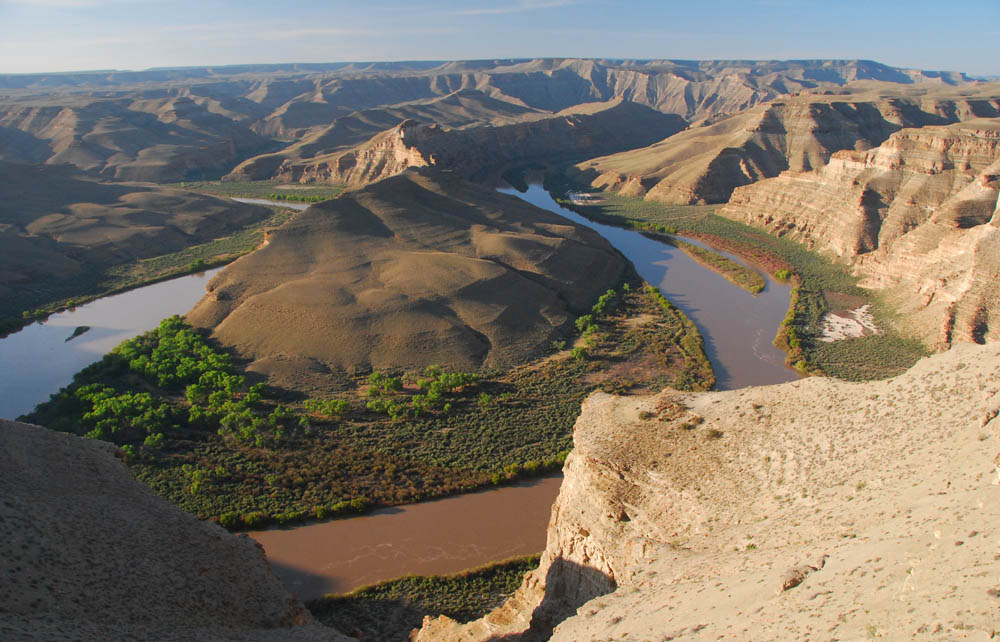|
SOUTHERN UTAH WILDERNESS ALLIANCE *
THE WILDERNESS SOCIETY * NATURAL RESOURCES DEFENSE COUNCIL * GRAND CANYON TRUST * SIERRA CLUB *
NATIONAL PARKS CONSERVATION ASSOCIATION
For immediate release
Contacts:
Stephen Bloch, Southern Utah Wilderness Alliance, 801.428.3981
Nada Culver, The Wilderness Society, 303.807.6918 (cell)
Sharon Buccino, Natural Resources Defense Council, 202.289.2397
Conservation Groups and Oil and Gas Company Negotiate Compromise to Protect Wild Desolation Canyon and Permit Natural Gas Development
 SALT LAKE CITY (July 29, 2010): Today, a coalition of conservation organizations announced they have reached an historic agreement with the Bill Barrett Corporation, a Denver-based oil and gas company. SALT LAKE CITY (July 29, 2010): Today, a coalition of conservation organizations announced they have reached an historic agreement with the Bill Barrett Corporation, a Denver-based oil and gas company.
The West Tavaputs agreement ensures that the Desolation Canyon stretch of the Green River will be protected from the sight and sound of industrial development even during the development and extraction of substantial natural gas reserves that Barrett currently has under lease.
The agreement cleared the way for the Bureau of Land Management to approve on Friday, July 30th, the ‘West Tavaputs Full Field Natural Gas Development Project’ record of decision. The agreement and record of decision are also supported by the state of Utah, the Utah School and Institutional Trust Lands Administration, and Carbon County.
The Desolation Canyon portion of the Green River, one of the West’s most iconic and remote stretches of river, was designated a National Historic Landmark in 1969. Because of that designation, the BLM is required to manage the canyon to retain its remote and natural setting.
“The Desolation Canyon proposed wilderness area in Utah is one of the most remarkable, remote landscapes in the lower 48 states,” said Southern Utah Wilderness Alliance Attorney and Energy Program Director Stephen Bloch. “By working with the Bill Barrett Corporation, we have been able to protect and enhance this crown jewel of the public lands while allowing the company to achieves its goal of developing the natural gas resource. This also serves as a powerful example of the progress that is resulting from the constructive ongoing discussions between advocates for Utah wilderness and county commissioners, land managers, and energy companies.”This agreement shows that there is room for both oil and gas development and wilderness protection, just as Ken Salazar said when he took the reins at the Interior Department last year, ,” said Senior Counsel and BLM Action Center Director for the Wilderness Society, Nada Culver. “We see this agreement between the conservation community and the Bill Barrett Corporation as a good model as we move forward with the new approach to managing oil and gas as just one of the many uses of our public lands.”
The agreement between the conservation community and BBC resulted in a dramatically reduced surface footprint, particularly in the Desolation Canyon and Jack Canyon proposed wilderness areas, while permitting BBC to recover the considerable natural gas resource in the area. As originally conceived and planned during the Bush administration, the West Tavaputs project included over 225 surface locations in proposed wilderness areas. Under this agreement and BBC’s contracted surface development plans, fewer than six locations would be developed. In addition, the placement of gates on several remote dirt roads will ensure that fragile cultural sites, wildlife, and wilderness values are protected.
“We are pleased to support this decision and believe that it reflects a careful, thoughtful and collaborative approach to balancing resource protection and development,” said Southwest Region Director for the National Parks Conservation Association. “It further reflects a process that has engaged all stakeholders in finding a solution we can all be proud of.”
In January 2010, historic preservation and conservation organizations, the BLM, the Bill Barrett Corporation, and state and county officials signed a so-called Programmatic Agreement that set forth a framework for ensuring that natural gas development in this area, including truck traffic in the famed Nine Mile Canyon, is done in a way that protects the area’s significant cultural resources. According to the BLM’s website, the Nine Mile Canyon region contains the “the greatest concentration of rock art sites in the U.S.A.” (See http://www.blm.gov/ut/st/en/fo/price/recreation/9mile/9mile_col2.html.) More than 1,000 of these sites have been identified, along with centuries-old standing structures such as cliff dwellings and pit houses.
>> View photographs of the Desolation Canyon and Jack Canyon proposed wilderness areas
|
|
|

 Southern Utah Wilderness Alliance
Southern Utah Wilderness Alliance
 Southern Utah Wilderness Alliance
Southern Utah Wilderness Alliance